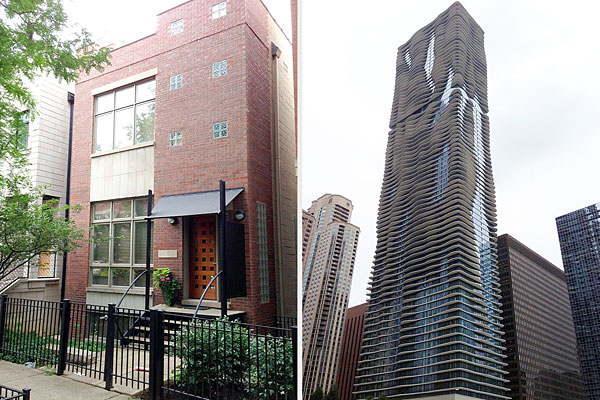
Photography: Dennis Rodkin
This Bucktown home (left) went for $1.2 million in cash, and buyers paid $463,000 in cash for a condo on the 79th floor of Aqua.
Some people actually pay cash to buy a house. In fact, it happens more than you'd probably expect—in the first half of 2013, cash paid for 34 percent of all homes bought in the Chicago area, according to data that RealtyTrac released exclusively to Chicago. For the month of June, cash bought 30 percent of local homes, which was even with the national average in data the company released last week.
Many of those cash buyers were investors, either the big corporate type or the smaller individual type. But real estate agents and others say the number of end-users buying homes for their own use and paying cash has risen steeply this year. (I could not find data that breaks down which cash buyers are end users and which are investors.)
An end user paid $3.8 million in cash for an Evanston lakefront mansion, Crains reported late last week. This house in Bucktown went for $1.2 million in cash in May, according to the listing agent, Dan Kawabata of @Properties. And this one-bedroom on the 79th floor of Aqua went for just under $463,000, paid in cash, says its listing agent, Redfin’s Greg Whelan.
Whelan says that so far in July, three of the eight transactions he’s been involved with have been cash sales.
The reasons homebuyers have been using cash, according to Kawabata and Whelan, include:
- They want to be the sharpest competitor in a multiple-bid situation. A cash offer is “the cleanest offer,” Whelan says. It assures the seller that the deal won’t fall through for lack of financing, and it typically offers a faster closing because it eliminates the wait for the mortgage process.
- They know that sellers sometimes will accept a lower-priced cash offer over a higher-priced offer that will be financed, to avoid the hassle.
- They may believe that the value of the home they want is above what an appraiser would calculate based on comps from the recent past. Paying cash instead of getting a mortgage leaps over a mortgage lender’s requirement of an appraisal, Kawabata points out.
- Although it’s been easing recently, jumbo loans—mortgages for more than $417,000 in the Chicago area—were difficult to get for the past few years so buyers of higher-priced homes had been lining up cash for the home purchases they wanted to make this year.
But let's get to what you really want to know: How can anybody afford to pay hundreds of thousands of dollars in cash for a house?
Some are trust fund babies or they've received an inheritance. Others get cash from still-living parents who want to help their kids land a bargain now. Some are “fortunate to be in industries where [they] generate significant income,” as Whelan puts it (i.e., they’re not in journalism or whatever you’re doing right now). And some, Kawabata says, “were hesitant to buy from 2008 until now, so they were investing somewhere else during that time and did well. Because of that, they have cash on hand.”
How can you compete with cash if you’re a conventional-financing buyer?
- “Make sure you’re solidly pre-approved” for a mortgage, Kawabata says, “and have a letter so we know we won’t be stuck later” after a seller accepts your offer.
- Make sure all other terms in your offer, such as the closing date are flexible, Whelan says, and let the seller fiddle with those s that your financing isn’t the deal-killer.
- Talk to whatever financial adviser you have about whether you should convert other assets—if you have them—to cash. Even if you can’t come up with the full purchase price, increasing your down payment stake to 25 percent or more can make you look like a better bet to a seller.
- Oh, one more thing: Win the the lottery.


